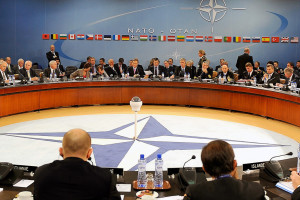Russia’s NATO envoy makes downbeat statements on ties with alliance

(Interfax – June 30, 2015)
Aleksandr Grushko, Russia’s permanent representative to NATO, has said:
– NATO is replacing its policy of partnership with Russia with a policy of deterrence;
– restoring NATO-Russia relations are not envisaged unless the alliance changes its views on cooperation;
– Russia will take into account the NATO “threat” in its military planning;
– NATO’s role in the Ukrainian conflict is “absolutely destructive”;
– NATO has no role in settling the conflict in Moldova’s breakaway Dniester region;
– a possible final deal on Iran’s nuclear programme will be a “moment of truth” for NATO, as this was the “pretext” for the US missile defence system in Europe; and
– Russia would consider Montenegro joining NATO to be an “unequivocally negative step”.
Grushko was speaking in a video conference with Brussels on 30 June, privately-owned Russian news agency Interfax reported.
Partnership replaced by deterrence
NATO is moving from a policy of partnership with Russia to a policy of deterrence, he said.
This is the way decisions made at the meeting of NATO members states’ defence heads in Brussels on June 24-25 should be interpreted, he said.
“This meeting was yet more proof that NATO is switching from a policy of partnership to a policy of deterring Russia. Unfortunately, the political line we have observed in the last year-and-a-half is being confirmed by military building and planning,” Grushko was quoted as saying.
Restoring NATO-Russia ties not on cards
As for the possibility of restoring NATO-Russia relations, Grushko said: “All our cooperation projects are frozen. If NATO does not reconsider its attitude to prospects for uniting efforts in the joint fight with common threats and challenges, then there will be no sign of prospects for restoring relations in the full sense of this word.”
Previously, the “quality of relations was determined by the ability to counter common threats”, he added.
Russia to factor in NATO “threat”
Asked about what retaliatory measures Russia would take in response to the deployment of military potential along Russia’s borders, Grushko said: “In our military planning we will take into account the potential of this new capacity along our borders, and we will take all possible measures to counter the threat related to the deployment of this potential.
NATO role in Ukraine “destructive”
As for NATO’s role in the conflict in southeast Ukraine, Grushko said: “NATO’s role in the Ukrainian situation today, in the political and military sense, is absolutely destructive.”
He went on: “The best role for NATO in settling the Ukrainian conflict would be if the subject of Ukraine had bypassed NATO. Then there would have been more favourable conditions to seek a peaceful settlement using all the tools that Europe has, tools that should ensure a way out of this crisis in a peaceful way.”
The NATO line in Ukrainian affairs “plays into the hands of those who dream about reaching a resolution of the crisis by military means”, he added.
“You get the impression at times that NATO is living in its own virtual world that has been specially created, and does not draw on objective information that can be obtained from reports of OSCE mission observers,” he said.
No role for NATO in Dniester settlement
Regarding the settlement of the Dniester region conflict, Grushko said: “I start from the principle that NATO does not have, and cannot have, any role in resolving the conflict. There are international principles and formats that were approved by the OSCE [Organization for Security and Cooperation in Europe] and UN, so one should move along the path that was determined by the bulk of the documents that have been drawn up to date.”
He went on: “We see all the dangers regarding what the Moldovan and Ukrainian authorities are undertaking, regarding the ending of transport links, the introduction of limitations on economic operations, and attempts to establish an economic blockade.”
“This is an extremely dangerous path,” he said, “as we know how much effort has been put into preserving peace and calm in this region of the world. It is a frozen conflict, but the situation has been quite stable.”
Iran nuclear deal “moment of truth” for NATO
On a possible final agreement about Iran’s nuclear programme, Grushko said: “We know that the European segment of the missile defence system was deployed under the pretext that it was necessary to defend Europe and allies from the Iranian nuclear threat.”
He went on: “We hope the issue will be removed from the international agenda as an issue related to security, and then will come a moment of truth for our partners: what was this system created for.”
Russia opposes Montenegro NATO membership
As for the possibility of Montenegro joining NATO, Grushko said: “This is an unequivocally negative step for European security and our relations with Montenegro because it is obvious that a country with which we have close historical ties, spiritual unity, human relations, primarily a mutually intertwined history, is joining an organization that is unfriendly to Russia.”
Russia’s attitude to NATO expansion has not changed, Grushko said. “We think that none of the real security issues will be resolved,” he said.
[featured image is file photo]
